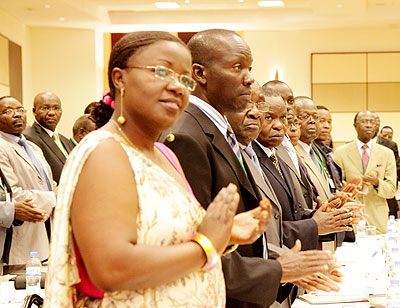Heads of higher institutions of learning in the region say governments should intervene and collaborate with the Inter-University Council for East Africa (IUCEA) to ensure appropriate harmonisation of the regional education system.


Heads of higher institutions of learning in the region say governments should intervene and collaborate with the Inter-University Council for East Africa (IUCEA) to ensure appropriate harmonisation of the regional education system.The call was made at the just-concluded IUCEA meeting in Kigali.The dons observed that partner states have not demonstrated the expected determination in cooperating with IUCEA, something they said has resulted in delaying of the harmonisation process of the education system."Harmonisation of our education system will depend on governments’ intervention. If they decide to take up the matter seriously, there is no doubt we shall achieve it. If they leave it with IUCEA, East Africans should not expect it today or tomorrow. It will take time,” Prof. Patrick Manu, the vice chancellor of Bugema University in Uganda told The New Times.He pointed out that there are many issues that need to be discussed with governments, citing harmonisation of tuition fees among all institutions.Manu said that at his institution, all students from the region pay the same amount of fees on all courses as nationals.Article 102 (e) of the EAC Treaty stipulates that partner states shall harmonise curricula, examination, certification but hitherto, universities still use their national systems.Prof. Mabel Imbuga, the vice chancellor of Jomo Kenyatta University of Agriculture and Technology, mentioned that some universities had distorted the education system by lowering fees, adding that IUCEA cannot manage such institutions unless governments intervene."The most important thing is quality education. There are universities in Uganda, Tanzania and Kenya that are lowering fees just to get students…they don’t mind about the quality. I don’t know how it is in Rwanda and Burundi,” he said, calling for political will by governments to fight such tendencies.The rector of School of Finance and Banking (SFB), Prof. Reid E Whitlock, noted that only Rwanda has shown a commitment in the integration process saying that for the education system to develop, all countries needed equal commitment."We need a similar objective if we are to harmonise and develop our education system in the region. Some countries are not committed and their universities are after quantity instead of quality and these are the serious concerns that partner states must look into first,” he said.Prof. Keto Mshigeni, the vice chancellor of Hubert Kairuki Memorial University in Tanzania, pointed out that it would be difficult to achieve the harmonisation of the education system since governments only focus on public institutions thus foregoing the private ones."Our private universities are under funded. Governments are focusing on their institutions and we are also dealing with ours; therefore it will be hard to harmonise all these systems.”He reiterated that private institutions lower their fees with the aim of getting more students just to sustain themselves as well as make profits.The President of the Inter-University Council for East Africa (IUCEA), Professor Silas Lwakabamba, has always urged higher institutions of learning in member states to charge citizens from member states the same tuition fees as their locals.Lwakabamba, who is also the Rector of the National University of Rwanda (NUR), said that whereas students from EAC countries, since the 2009 academic year, pay similar fees as Rwandan nationals at his University, other institutions are yet to follow suit.The IUCEA is a regional body comprising over 70 higher education institutions within the bloc.


